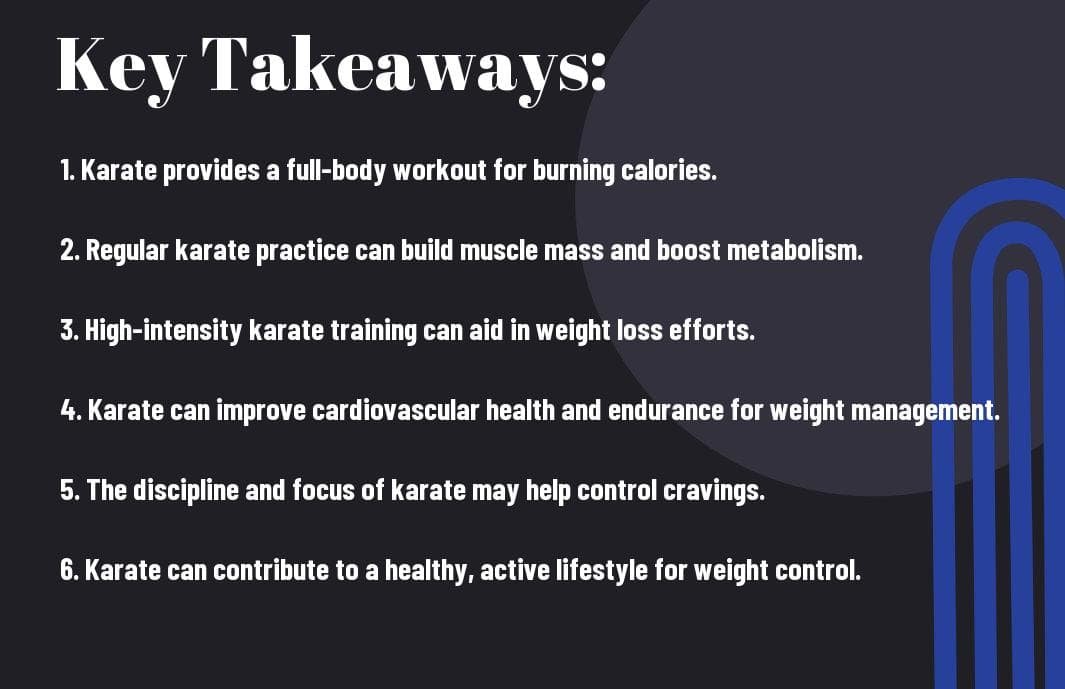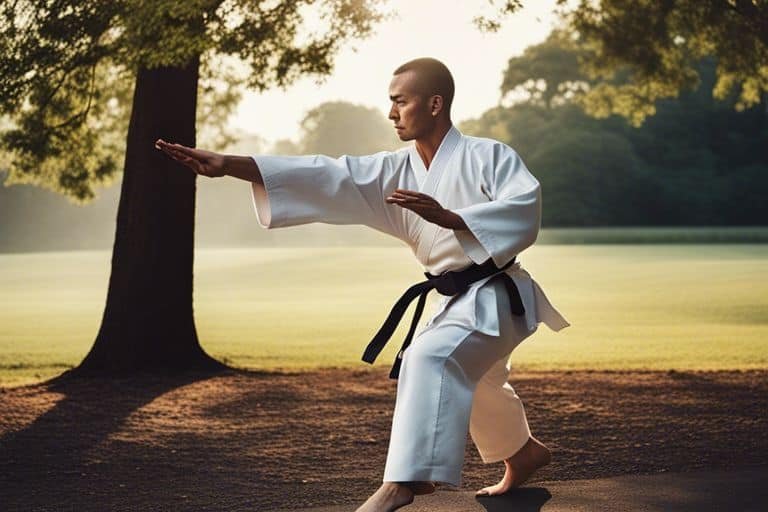Are you struggling to shed those extra pounds and looking for an effective, powerful way to manage your weight? Consider incorporating karate into your fitness routine. Karate is not just a self-defence discipline, it is also an excellent full-body workout that can help you burn calories, increase your strength, and improve your overall fitness level. In this informative blog post, we will explore how practising karate can be beneficial for your weight management goals.
Key Takeaways:
- Karate can be a high-energy, calorie-burning workout. By engaging in karate, individuals can burn a significant amount of calories, thereby aiding in weight management.
- Karate promotes muscle conditioning and toning. The various movements and stances in karate help in building and toning muscles, which can contribute to a leaner and more toned physique.
- Karate can improve overall physical fitness. Engaging in karate regularly can improve cardiovascular health, endurance, and flexibility, all of which are important for weight management.
- Karate promotes discipline and self-control. The mental aspect of karate, including discipline and self-control, can extend to one’s approach to diet and lifestyle choices, supporting weight management goals.
- Karate can be a sustainable form of exercise. As a martial art, karate offers a long-term approach to physical activity, making it a sustainable option for weight management.

The Essentials of Karate
When it comes to weight management, physical activity is essential. Karate is one such martial art that not only helps you stay fit and active but also provides various other physical and mental benefits. In this chapter, we will explore the essentials of karate and how it can contribute to your weight management journey.
Karate: A Brief Overview
Karate is a traditional Japanese martial art that focuses on striking techniques such as punching, kicking, knee and elbow strikes, and open-hand techniques. The word “karate” means “empty hand,” which reflects the fact that it is primarily a non-weapon discipline. This martial art has a strong emphasis on self-discipline, physical conditioning, and mental focus. Through rigorous training and practice, you can improve your strength, agility, flexibility, and overall physical fitness.
Key Movements in Karate and Their Physical Benefits
Key movements in karate include stances, strikes, blocks, and kicks. These movements are not only essential for self-defense but also offer various physical benefits. The stances and strikes in karate engage multiple muscle groups, which can help in building strength and improving muscle tone. Additionally, the intense and fast-paced nature of karate training can help you burn a significant amount of calories, contributing to weight management. The mental focus and discipline required in mastering these movements can also positively impact your overall well-being, helping you stay motivated and committed to your fitness goals.
Karate Training and Caloric Burn
When it comes to weight management, the number of calories you burn during physical activity plays a crucial role. Karate training is a high-intensity workout that can help you burn a significant amount of calories. The combination of aerobic and anaerobic exercises in karate leads to an effective caloric burn, making it a valuable tool in your weight management journey.
Metabolic Impact of Karate
Karate training involves a variety of movements such as punches, kicks, and blocks that engage multiple muscle groups simultaneously. This leads to an increase in your metabolic rate, allowing you to continue burning calories even after your training session is over. The high-intensity nature of karate also stimulates the production of growth hormone, which further aids in fat metabolism and muscle development.
Comparing Karate to Other Forms of Exercise for Weight Loss
When comparing karate to other forms of exercise for weight loss, it’s important to consider the caloric burn and the overall impact on your metabolism. Below is a comparison of karate with other popular exercises:
| Karate | Running |
| High-intensity, full-body workout. | Primarily lower body workout. |
| Combines aerobic and anaerobic exercises for maximum caloric burn. | Primarily aerobic exercise, less impact on muscle development. |
| Stimulates metabolism for continued calorie burn post-workout. | Caloric burn primarily occurs during the workout. |
As you can see, karate offers a unique combination of high-intensity, full-body workout and metabolic stimulation, making it an effective option for weight management and overall fitness.
Nutrition and Karate
When it comes to weight management, nutrition plays a crucial role in achieving your fitness goals. This is especially true for individuals who practice karate, as the physical demands of this martial art require a balanced and nutritious diet to fuel your performance and support your overall well-being. In this chapter, we will explore the impact of nutrition on your karate training and how you can make informed dietary choices to optimise your performance and manage your weight effectively.
Dietary Considerations for Karate Practitioners
As a karate practitioner, it’s important to pay attention to the composition of your diet to ensure that you are meeting the specific nutritional needs of your training. A diet rich in lean protein, complex carbohydrates, healthy fats, and a variety of vitamins and minerals is essential for supporting muscle recovery, sustaining energy levels, and promoting overall health. Additionally, adequate hydration is crucial for maintaining your performance and optimising your training sessions.
Balancing Caloric Intake with Karate Training Intensity
When it comes to managing your weight as a karate practitioner, it’s important to strike a balance between your caloric intake and the intensity of your training sessions. Consuming the right amount of calories to fuel your training while staying within a healthy range for weight management is key. If you’re looking to lose weight, creating a moderate caloric deficit through a combination of diet and exercise can help you achieve your goals without compromising your performance in karate.
Long-term Benefits of Karate
Engaging in karate training offers a multitude of long-term benefits that can positively impact your weight management journey. Beyond the physical activity and calorie-burning benefits, karate provides a holistic approach to overall health and well-being.
Sustaining Weight Loss through Consistent Practice
Consistent karate practice can help you sustain weight loss by building lean muscle mass and increasing your metabolic rate. The high-intensity nature of karate training helps you burn a significant amount of calories during each session. Additionally, the muscle-building aspect of karate contributes to an overall increase in your resting metabolic rate, meaning you will continue to burn calories even when you are not active.
Psychological Benefits of Karate and Their Role in Weight Management
Aside from the physical benefits, the psychological aspects of karate can also play a significant role in your weight management journey. The discipline and focus required in karate training can help you develop a more mindful approach to eating and lifestyle choices. The sense of achievement and confidence gained from progressing in your karate practice can also positively impact your self-image and motivation to maintain a healthy weight.
FAQ
Q: Can Karate Help in Weight Management?
A: Yes, Karate can be an effective form of exercise for weight management. It combines cardio, strength training, and flexibility, making it a full-body workout that can help in burning calories and building lean muscle.
Q: How does Karate contribute to weight loss?
A: Karate involves a lot of physical activity, including kicking, punching, and moving around, which can elevate your heart rate and burn calories. Additionally, regular practice of Karate can increase your metabolic rate, helping you to burn more calories throughout the day.
Q: Is Karate suitable for all fitness levels?
A: Yes, Karate can be adapted to suit all fitness levels. Beginners can start at a comfortable pace and gradually increase the intensity of their training as they become more proficient.
Q: How frequently should one practice Karate for weight management?
A: For weight management, it is recommended to practice Karate at least 3-4 times a week. Consistency is key when it comes to seeing results.
Q: Are there specific Karate techniques that are more effective for weight management?
A: While all Karate techniques contribute to weight management, high-intensity moves such as kicks and punches can be particularly effective in burning calories and boosting metabolism.
Q: Can Karate help in toning the body?
A: Yes, Karate requires the engagement of various muscle groups, which can help in toning the body and increasing overall muscle definition.
Q: What other benefits does Karate offer for weight management?
A: In addition to weight management, Karate can also improve coordination, flexibility, and overall physical and mental well-being, making it a well-rounded form of exercise.



